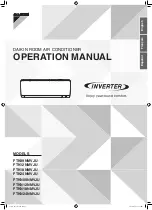
YMGI, Engineered Comfort Products for A Sustainable and Efficient Green World!
YMGI: Your Modern Green Idea
31
Running Interconnecting Refrigerant Lines:
Use clean refrigeration grade copper pipe only. Keep the copper lines from kinking and transmitting any noise to
walls, cabinets, etc. Pipe length not to exceed 50 feet, elevation not to exceed 35 feet. Insulate both the liquid and
gas copper lines with at least 3/8-inch-thick insulation tubes. Band, tape and secure the refrigerant lines. Support
copper lines at a proper distance apart to keep the tubes from sagging.
CUT REFRIGERANT PIPE
Make sure where the pipe is to be cut is straight and smooth. Engage the cutting blade. The cutting blade must be
straight and perpendicular to the pipe surface. Don't cut too fast or apply too much pressure. Turn and tighten the
tube cutter slowly. Remove residual and de-bur the cut edge. The cut edge should be smooth and clean.
Connect Copper Pipes-Flare/Nut Connection at Indoor and Outdoor Units
Proper torque should be applied to create a good connection at the female nut, flare and male nut, as
recommended in the following table. Too much torque may damage and break the flare/nut seal. Too little torque
may not ensure a good seal. ALWAYS use a pair of wrenches when tightening.
Refrigerant Pipe Flare/Nut Connection Tightening Torque
Flare Nut
Tightening Torque
1/4"
– 3/8”
25 ft. lbs. (350 kg-cm)
1/4"
– 1/2"
40 ft. lbs. (560 kg-cm)
1/2"
– 3/4"
60 ft. lbs. (840 kg-cm)
7/8” – 1 1/8”
110 ft. lbs. (1540 kg-cm)
















































